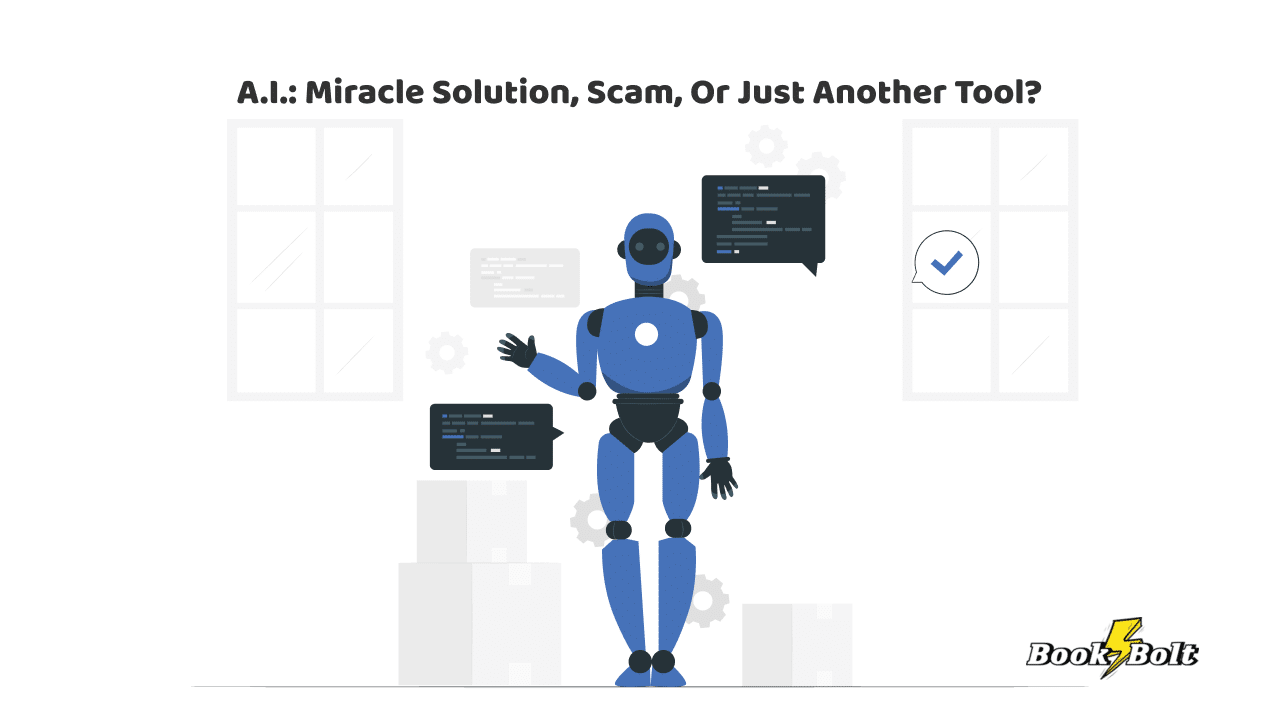
For the sake of organization, let’s sort out this group, okay?
First, anyone who got into the no/low-medium content book business to get rich quick, raise your hand.
Okay, you can scroll away and click on the first scammer ad that comes up (ever notice that no one uses the word “funnel” anymore?). They’re waiting for you.
IF IT LOOKS TOO GOOD TO BE TRUE…
The rest of you can hang here, because we’re definitely of a type. We got into this business for a variety of reasons: creative outlet, second income stream (I’ve resolved to avoid the term side hustle”), etc. We did not get into this business because we thought we’d get rich quick. Even if we did, the terms “rich” and “quick” have different meanings for different people.
One thing in common with these “get rich quick” schemes is a promise that you’ll make (seductively semi-realistic-sounding number) per month. This is a deliberate structure, because it is enticing enough to get a critical mass of people to buy their service, take their course, or subscribe to their system for one month. That first month is critical: scammers count on the scammed to do either of a few things:
- Spend a few months trying the system before they realize it doesn’t work and then opt out (gotchu for a couple months’ fees that you’ll never get back)
- Forget you signed up at all until your next credit card bill, when you’ll most likely mutter that you need to cancel, then forget again until the next month, and so on and so on
- Realize you’ve been had after the first month and cancel
These scammers don’t count on subscribers the way a solid subscription business does. They rely on “churn,” the constant in-and-out of new suckers, er, customers.
It’s a reliable business model, for sure…if you’re a sociopath.
…THEN IT’S PROBABLY NOT USING A.I. THE RIGHT WAY
Now, the latest scam making the rounds is “Write A Book In Fifteen Minutes With A.I. And Make (aforementioned dollar amount per unrealistic time period).”
First, that’s not how A.I. works. It’s not a genie that you can command “write me the Greatest American Novel”, spit it out fully formed like Athena from Zeus’ brain, put it out into the world and the Benjamins start flowing.
A book is not like a cookie or a candy bar or any other consumable commodity where the experience is the same from chip to chip. It’s part art, part science and therefore all alchemy. And you are the only alchemist who can connect with someone who will buy your product. You can’t outsource it.
Another thing: imagine putting your name on a book that Skynet wrote for you and asking people to buy and read it, while you haven’t even read it yourself? If that sounds insane, then congratulate yourself for being sane.
“A.I.” = “ALMOST INTELLIGENT”
(We’re going to focus on the textual side of A.I. here. In future pieces, we’ll go into the even more controversial image-generation part of this evolving technology)
For one thing, A.I. is dumb. ChatGPT, the current best-known name in this new frontier, is what’s called a “Large Language Model”. The AI learns how to communicate via text-based sources, from library-sized uploads to exposure to prompts from users to internet research. As you can imagine, even though it started as an encyclopedia, once it was exposed to the general population, increasingly looking to it as a miracle worker, it got dumber.
I can validate many of the news reports to this effect, as I’ve been using it for a variety of projects (no, Neil, not for blog writing) for a year, and it has become increasingly less reliable.
I’m working on a book about international horror movies over the last hundred years, and being a lifelong fan of the genre (listen to my podcast!), I could tell right away that it was not just slightly off, but TOTALLY WRONG on several counts. It actually said that the period between WW1 and WW2 was a fallow period for horror films in Germany, when I’ve known since friggin’ film school that the horror genre was practically born there during that time.
“The Cabinet of Dr. Caligari” (1920 – last time I checked)
How does this apply to the no/low/medium-content KDP space?
There are a lot of folks who are crowding the market with low/no/medium-content books on KDP right now, that’s an unfortunate fact.
It’s tempting to thing that A.I. tools can help you get an edge, maybe blow past all the others by producing more and faster.
It won’t.
However, it can still be a reliable assistant. As long as you understand its limitations, as described above.
A.I.: JUST LIKE ANY OTHER ASSISTANT
For me, A.I. is a solution to the dreaded BLANK PAGE
Scared yet?
Whatever level of content you intend to produce, chances are that when you see that blinking cursor at the top of the blank page you can hear it laughing at you. The blank page still terrifies me until I metaphorically stick my finger down my throat and vomit out the first idea. Any writer will tell you that a “vomit draft” is necessary. Forget the “v” word, it’s the lump of clay that you need in front of you so you can see how you need to shape it.
This is where A.I. comes in.
For example, now that Amazon is cracking down on “no-content” books with repetitive pages, it is still possible to create simple journals or sketchbooks with little more than a factoid or trivia question on each page. Same journal layout, but with a little something different on each page. This not only helps work within Amazon’s regulations, it also makes a better product.
Ask ChatGPT anything from “What kind of people rely on blank journals to stay organized?” to “What kind of activities/entertainment do (answer to the first question) tend to gravitate to?” and “Give me fifty facts/trivia points about (one of the answers to the second question).”
Of those fifty responses, you’ll find that maybe half of them are correct – use your own knowledge or ten minutes of Googling to confirm.”
Voila! You now have two dozen factoids that you can include in a KDP journal targeted to a niche audience.
Without the AI, you’d have to do all the thinking, from scratch. Not that there’s anything wrong with that, but with the speed of business today, the number of get-rich-quickers who will crowd the market, anything that can save you time is a benefit.
Maybe someday AI might be the single-button-push solution being promised. Or it could be the Terminator-birthing extinction event that’s been threatened. But not today. Today it is like any other assistant – helpful, but…just as human as you and I.



